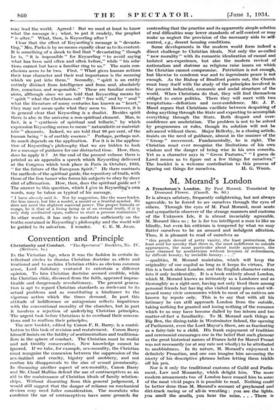Convention and Principle
Christianity and Conduct. "The Spectator" Booklets, No. IV. (Methuen. ls.) Ix the Victorian Age, when it was the fashion in certain in- tellectual circles to dismiss Christian doctrine as effete and irrational and to acclaim Christian ethics as obvious common sense, Lord Salisbury ventured to entertain a different opinion. To him Christian doctrine seemed credible, while the Christian ethic, divorced from the faith, appeared imprac- ticable and dangerously revolutionary. The present genera- . tion is apt to regard Christian standards as irrelevant to its actual problems and as constituting a hindrance to the vigorous action which the times demand. In part this attitude of indifference or antagonism reflects impatience with the conventional morality of the churches, but in part it involves a rejection of underlying Christian principles. The urgent task before Christians is to overhaul their conven- tions and to reaffirm their principles.
The new booklet, edited by Canon F. R. Barry, is a contri- bution to this task of revision and restatement. Canon Barry himself insists on the futility of sentimentalism and traditiona- lism in the sphere of conduct. The Christian must be realist and not timidly conservative. New knowledge cannot be ignored. If we take, for example, sex-morality, the Christian must recognize the connexion between the suppression of the sex-instinct and cruelty, bigotry and snobbery, and not confine his disapprovals to the sins of sexual promiscuity. In discussing another aspect of sex-morality, Canon Barry and Mr. Claud Mullins defend the use of contraceptives as an aid to the maintenance of Christian ideals of family relation- ships. Without dissenting from this general judgement, I Mould still suggest that the danger of reliance on mechanical devices may need fuller consideration. The moralists who condemn the use of contraceptives have some grounds fer contending that the practice and its apparently simple solution of real difficulties may lower standards of self-control or may make us neglect the provision of the necessary aids to self- control, e.g., decent housing conditions.
Some developments in the modern world form indeed a direct challenge to Christian ideals. Not only the so-called " new morality" with its romantic idealization of casual and isolated sex-experience, but also the modern revival of nationalism and daiisme as religions raise issues on which the Christian cannot compromise. Patriotism is not enough, but likewise to condemn war and to ingeminate peace is not enough. As the Bishop of Bradford points out, the Church must busy itself with the study of the principles involved in the present industrial, economic and social structure of the world. When Christians do that, they will find themselves obliged to enter politics. There they will meet with two temptations—defeatism and over-confidence. Mr. J. P. Maud argues that Christians vacillate between despairing of doing anything through the State and expecting to accomplish everything through the State. Both despair and over- confidence are unchristian. The problem is not to be solved by programmes or rules, though its solution will not be advanced without them. Major Bellerby, in a closing article, insists on the need of guidance, almost in the manner of the
Group " movement. Fundamentally, lie is right. The Christian must ever recognize the limitations of his own wisdom and the danger of being wise in his own conceits. Yet as a character says iu " Green Pastures," " I guess de Lawd means us to figure out a few things for ourselves." The booklet is a welcome contribution to this process of figuring out things for ourselves. H. G. WOOD.




































 Previous page
Previous page